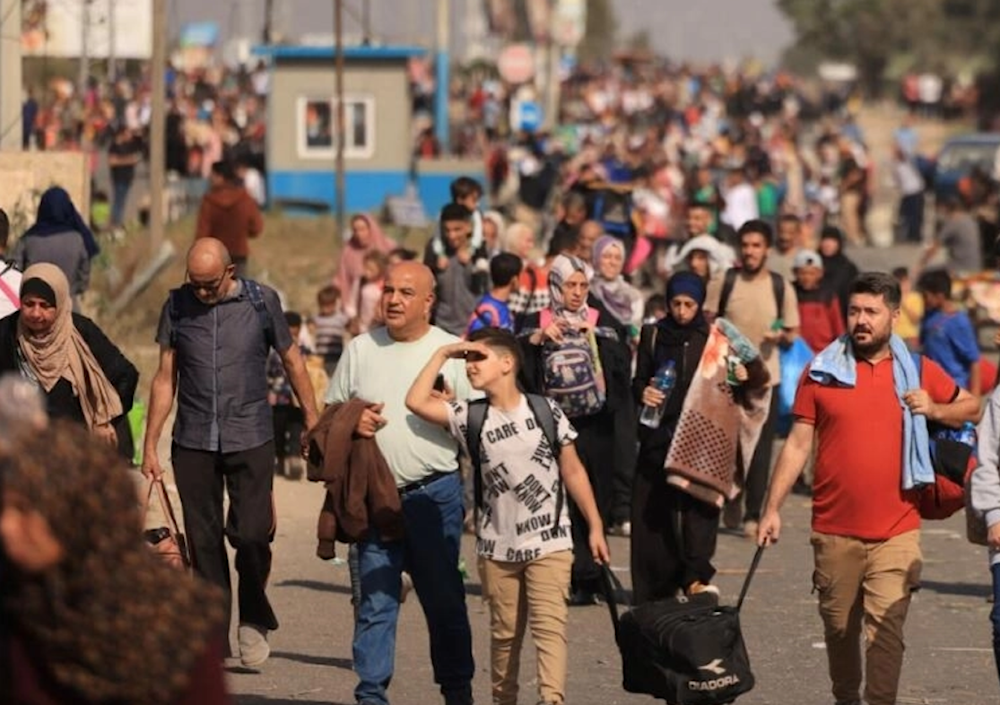With no food, water, nearly 2mln Palestinians crowded in South Gaza
Satellite images and aid agency data show damage from airstrikes near practically every shelter in Gaza this month, with some shelters having been directly struck in several circumstances.
-

Palestinian families fleeing Gaza City and other parts of northern Gaza toward the southern areas walk along a highway on November 9, 2023. (AFP)
As the humanitarian crisis in Gaza continues to worsen, evacuation orders and intense shelling by Israeli forces have pushed nearly two million Gazans further south.
Struggling with a lack of sanitation, food, and water, more than 1.7 million Gazans are registered in southern shelters, including a few hundred thousand scattered on roadsides and in open areas having failed to find a place within shelters.
It is noteworthy that the UN Agency for Palestinian Refugees (UNRWA) confirmed in early December that almost 1.9 million people, approximately 80% of Gaza's population, have been internally displaced since the start of the Israeli aggression on the Strip on October 7.
Gemma Connell, a UN humanitarian team leader deployed in Gaza for several weeks, pointed out on Monday that Palestinians in Gaza who fled to areas claimed to be "safe" by the Israeli military found that only a small space remains for them in the densely populated Strip, Reuters reported.
Connell described the current situation as a "human chessboard" where thousands of people who have already been displaced are now finding that there is no guarantee that their next destination will be safe.
"People were heading up south with mattresses and all of their belongings in vans and in trucks and in cars in order to try and find somewhere safe," she said.
Satellite images and aid agency data show damage from airstrikes near practically every shelter in Gaza this month with some shelters having been directly struck in several circumstances.
According to the United Nations assistance organization in Gaza, at least 299 displaced individuals have been killed in its shelters since the beginning of the war, with 81 deaths reported since November 30.
500 Palestinians share a single toilet in relief areas
Rafah is currently Gaza's most densely inhabited region. Data show that UN shelters in Rafah house an average of more than 15,000 registered individuals, even though most shelters were meant for 2,000 people.
Relief group authorities say the region is not able to deliver basic amenities to the displaced. Its three hospitals are only partially operational, and those living in shelters live in crowded quarters with no food or water. On average, about 500 individuals share a single toilet.
Satellite data also show Israeli military vehicles mere blocks away from three evacuated Khan Younis shelters. On December 5, 17,000 individuals were housed in these shelters, which became nearly vacant by December 12.
According to UNICEF, more than 50 United Nations school facilities in the south have been damaged since the war began. As of mid-December, the majority of these structures were still sheltering displaced individuals.
According to relief authorities, it has been impossible to trace Gaza's almost two million displaced Palestinians, many of whom have moved in and out of shelters and other people's houses since the aggression began.
It is considerably more difficult to quantify those who remain in the north, where "Israel" conducted its initial assaults and access has been limited. Preliminary estimates from the Palestinian Central Bureau of Statistics show that up to 500,000 Palestinians may have stayed there as of early December.
WHO condemns Israeli strike on Gaza's Maghazi refugee camp
Meanwhile, the World Health Organization condemned the recent airstrike carried out by the Israeli occupation on a refugee camp in the besieged Gaza Strip, resulting in the martyrdom of at least 70 Palestinian lives.
On social media platform X, Tedros Adhanom Ghebreyesus, the head of the UN health agency, conveyed significant concern in a post on Monday. He referenced touching narratives from health workers and victims, highlighting the profound suffering inflicted by the attacks.
"One child had lost their whole family in the strike on the camp. A nurse at the hospital suffered the same loss, with his entire family killed," he added.
Ghebreyesus' statement came a day after an Israeli airstrike targeted al-Maghazi Refugee Camp in the central region of Gaza, which has been under constant aggression by the occupation.
WHO today visited Al-Aqsa Hospital, where scores of injured people were taken overnight following strikes in central #Gaza, including in the vicinity of the Maghazi refugee camp.
— Tedros Adhanom Ghebreyesus (@DrTedros) December 25, 2023
Palestinian health authorities reported that 70 people were killed, while Al-Aqsa Hospital staff… pic.twitter.com/B5503C82CT

 4 Min Read
4 Min Read








